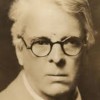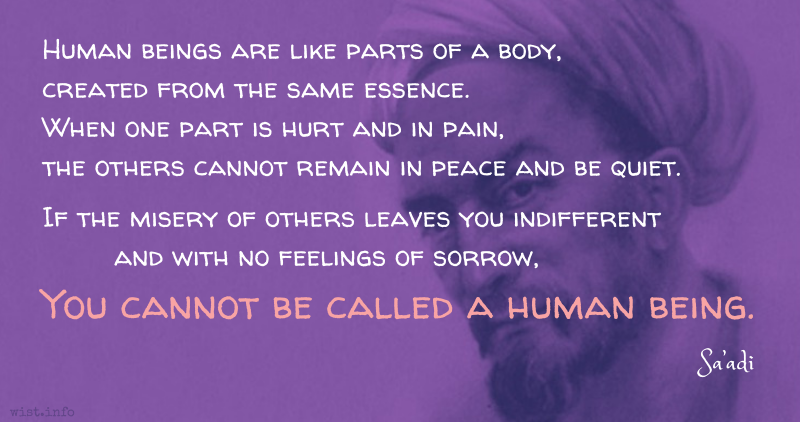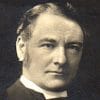Therefore all things whatsoever ye would that men should do to you, do ye even so to them: for this is the law and the prophets.
The Bible (The New Testament) (AD 1st - 2nd C) Christian sacred scripture
Matthew 7:12 (KJV)
Variants:
- Popularly, "Do unto others as you would have them do unto you."
- NIV: "So in everything, do to others what you would have them do to you, for this sums up the Law and the Prophets."
- NRSV: "In everything do to others as you would have them do to you; for this is the law and the prophets."
- TEV: "Do for others what you want them to do for you: this is the meaning of the Law of Moses and of the teachings of the prophets."
Note: The "Golden Rule" has been expressed in many ways by many religious and philosophical teachers. Several of these in WIST are or will be cross-referenced to this quotation (as trackbacks), not to lend it primacy, but because this is the most well-known formulation of it in the Western world, and to simplify the cross-referencing to one central point.
Quotations about:
compassion
Note not all quotations have been tagged, so Search may find additional quotes on this topic.
Strive to be patient; bear with the faults and frailties of others, for you, too, have many faults which others have to bear. If you cannot mould yourself as you would wish, how can you expect other people to be entirely to your liking?
[Stude patiens esse in tolerando aliorum defectus, et qualescumque infirmitates, quia et tu multa habes, quæ ab aliis oportet tolerari. Si non potes te talem facere qualem vis, quomodo poteris alium habere ad beneplacitum tuum?]
Thomas à Kempis (c. 1380-1471) German-Dutch priest, author
The Imitation of Christ [De Imitatione Christi], Book 1, ch. 16, v. 2 (1.16.2) (c. 1418-27) [tr. Sherley-Price (1952)]
(Source)
(Source (Latin)). Alternate translations:
Study always that thou mayest be patient in suffering of other men’s defaults, for thou hast many things in thee that others do suffer of thee: and if thou canst not make thyself to be as thou wouldst, how mayest thou then look to have another to be ordered in all things after thy will?
[tr. Whitford/Raynal (1530/1871)]
Study always to be patient in bearing other men's defects, for you have many in yourself that others suffer from you, and if you cannot make yourself be as you would, how may you then look to have another regulated in all things to suit your will?
[tr. Whitford/Gardiner (1530/1955)]
Endeavour thy selfe patiently to bear with any faults and infirmities of others, for that thou thy selfe hast many things that must be borne withall by others. If thou canst not make thy selfe such a one as thou wouldst be, how canst thou expect to have another to thy liking in all things?
[tr. Page (1639), 1.16.6-7]
Remember, that You also have many Failings of your own, by which the Patience of other People will have its turn of being exercised. And if you do (as certainly you cannot but) see this, think how unreasonable it is, to expect you should make others in all particulars, what you would have them to be; when you cannot so much as make your self, what you are sensible you ought to be.
[tr. Stanhope (1696; 1706 ed.)]
Endeavor, to be always patient of the faults and imperfections of others; for thou haft many faults and imperfections of thy own, that require a reciprocation of forbearance. If thou art not able to make thyself that which thou wishest to be, how canst thou expect to mould another in conformity to thy will?
[tr. Payne (1803), 1.16.3]
Endeavour to be patient in bearing with the defects and infirmities of others, of what sort soever they be; for that thyself also hast many [failings] which must be borne with by others. If thou canst not make thyself such an one as thou wouldest, how canst thou expect to have another in all things to thy liking?
[ed. Parker (1841)]
Endeavour to be always patient of the faults and imperfections of others, whatever they may be; for thou hast many faults and imperfection of thy own, that require forbearance from others. If thou art not able to make thyself that which thou wishest to be, how canst thou expect to mould another in conformity to thy will?
[tr. Dibdin (1851)]
Endeavour to be patient in bearing with defects and infirmities in others, of what kind soever; because thou also hast many things which others must bear with. If thou canst not make thyself such as thou wouldst, how canst thou expect to have another according to thy liking?
[ed. Bagster (1860)]
Endeavour to be patient in bearing with other men’s faults and infirmities whatsoever they be, for thou thyself also hast many things which have need to be borne with by others. If thou canst not make thine own self what thou desireth, how shalt thou be able to fashion another to thine own liking.
[tr. Benham (1874)]
Endeavour to be patient in bearing with the defects and infirmities of others, of what sort soever they be; for that thyself also hast many failings which must be borne with by others. If thou canst not make thyself such an one as thou wouldst, how canst thou expect to have another in all things to thy liking?
[tr. Anon. (1901)]
Try to bear patiently with the defects and infirmities of others, whatever they may be, because you also have many a fault which others must endure. If you cannot make yourself what you would wish to be, how can you bend others to your will?
[tr. Croft/Bolton (1940)]
Try to be patient in bearing with others’ failings and all kinds of weaknesses, for you too have many which must be put up with by others. If you cannot mould yourself exactly as you would, how can you get another to be satisfying to you?
[tr. Daplyn (1952)]
Yes, you do well to cultivate patience in putting up with the shortcomings, the various disabilities of other people; only think how much they have to put up with in you! When you make such a failure of organizing your own life, how can you expect everybody else to come up to your own standards?
[tr. Knox-Oakley (1959)]
Try to be patient in bearing with the failings and weaknesses of other people, whatever they may be. You too have many faults, which others have to endure. If you cannot make yourself the kind of person you wish, how can you expect to have someone else to your liking?
[tr. Knott (1962)]
Seek always to be tolerant of the shortcomings and failings of others. They also have much to tolerate in you. If you are unable to mould yourself as you wish, how can you expect others to conform to your liking?
[tr. Rooney (1979)]
Take pains to be patient in bearing all the faults and weaknesses of others, for you too have many flaws that others must put up with. If you cannot make yourself as you would like to be, how can you expect to have another person entirely to your liking?
[tr. Creasy (1989)]
Pity cureth Envy.
Thomas Fuller (1654-1734) English physician, preacher, aphorist, writer
Gnomologia: Adages and Proverbs, #3876 (1732)
(Source)
Pray for thy Enemy, for if thou beest a good Man thyself, thou canst not but rejoice to see thy worst Enemy become a good Man, too.
Thomas Fuller (1654-1734) English physician, preacher, aphorist, writer
Introductio ad Prudentiam, # 878 (1725)
(Source)
Bear patiently with the Defects of others, and labor to amend thy own.
Thomas Fuller (1654-1734) English physician, preacher, aphorist, writer
Introductio ad Prudentiam, # 389 (1725)
(Source)
Now, God has thus ordered things that we may learn to bear one another’s burdens; for there is no man without his faults, none without his burden. None is sufficient in himself; none is wise in himself; therefore, we must support one another, comfort, help, teach, and advise one another.
[Nunc autem Deus sic ordinavit, ut discamus alter alterius onera portare, quia nemo sine defectu, nemo sine onere, nemo sibi sufficiens, nemo sibi satis sapiens, sed oportet invicem portare, invicem consolari, pariter adjuvare, et ammonere.]
Thomas à Kempis (c. 1380-1471) German-Dutch priest, author
The Imitation of Christ [De Imitatione Christi], Book 1, ch. 16, v. 4 (1.16.4) (c. 1418-27) [tr. Sherley-Price (1952)]
(Source)
See Galatians 6:2.
(Source (Latin)). Alternate translations:
Therefore God hath so ordained that each one of us shall learn to bear another’s burden: for in this world no man is without default, no man without burden, no man sufficient to himself, nor no man wise enough of himself. Wherefore it behoveth each one of us to bear the burden of others, to comfort others, to help others, to inform others, and to instruct and admonish others in all charity.
[tr. Whitford/Raynal (1530/1871)]
Therefore, God has so ordained that each one of us shall learn to bear another's burden, for in this world no man is without fault, no man without burden, no man sufficient to himself, and no man wise enough of himself. And so it behooves each one of us to bear the burden of others, to comfort others, to help others, to counsel others, and to instruct and admonish others in all charity.
[tr. Whitford/Gardiner (1530/1955)]
But now God hath thus ordained that every man should have a burthen of his owne, let us learne to support and beare one anothers burthens. For there is none without defect, none without his burthen, no man sufficient by himselfe, no man wise enough of himselfe. But we ought to bear with one another, comfort one another, equally helpe, instruct, and admonish one another.
[tr. Page (1639), 1.16.11-13]
But, as the present Condition of the World is ordered, God hath furnished us with constant Occasions of bearing one another's Burthens. For there is no Man lives without his Failings; no Man that is so happy, as never to give Offence; no Man without his Load of Trouble; no Man so sufficient, as never to need Assistance; none so wise, but the Advice of others may, at some time or other, be useful and necessary for him: And therefore we should think ourselves under the strongest Engagements to comfort and relieve, and instruct, and admonish, and bear with one another.
[tr. Stanhope (1696; 1706 ed.)]
But in the present fallen state of human nature, it is his Blessed Will, that we should learn to bear one another's burthens: and as no man is free from some burthen of sin or sorrow; as none has strength and wisdom sufficient for all the purposes of life and duty, the necessity of mutual forbearance, mutual consolation, mutual support, instruction and advice, is founded upon our mutual imperfections, troubles and wants.
[tr. Payne (1803)]
But now God hath thus ordered it, that we may learn to bear one another's burdens; for no man is without fault; no man but hath his burden; no man sufficient of himself; no man wise enough of himself; but we ought to bear with one another, comfort one another, help, instruct, and admonish one another.
[ed. Parker (1841)]
But in the present fallen state of human nature, it is His Blessed Will that we should learn to bear one another's burthens: and as no man is free from some burthen of sin or sorrow, as none has a strength and wisdom sufficient for all the purposes of life and duty, the necessity of mutual forbearance, mutual consolation, mutual support, instruction, and advice, is founded upon our mutual imperfections, troubles, and wants.
[tr. Dibdin (1851)]
But now God has so ordered it, that we learn to bear one another's burdens; for there is no man without defect, no one without his burden, no man sufficient for himself, no man wise enough for himself; but we must support one another, comfort one another, assist, instruct, and admonish one another.
[ed. Bagster (1860)]
But now hath God thus ordained, that we may learn to bear one another’s burdens, because none is without defect, none without a burden, none sufficient of himself, none wise enough of himself; but it behoveth us to bear with one another, to comfort one another, to help, instruct, admonish one another.
[tr. Benham (1874)]
But now God hath thus ordered it, that we may learn to bear one another's burdens; for no man is without fault; no man but hath his burden; no man is sufficient of himself; no man is wise enough of himself; but we ought to bear with one another, comfort one another, help, instruct, and admonish one another.
[tr. Anon. (1901)]
But God has so ordained, that we may learn to bear with one another's burdens, for there is no man without fault, no man without burden, no man sufficient to himself nor wise enough. Hence we must support one another, console one another, mutually help, counsel, and advise.
[tr. Croft/Bolton (1940)]
But now God has so arranged that we may learn to bear each other’s burdens, for none is faultless, none without a burden, none sufficient to himself, none wise enough in himself: but we must bear with each other, comfort each other, help, teach, and advise each other.
[tr. Daplyn (1952)]
He will have us learn to bear the burden of one another's faults. Nobody is faultless; each has his own burden to bear, without the strength or the wit to carry it by himself; and we have got to support one another, console, help, correct, advise one another, each in his turn.
[tr. Knox-Oakley (1959)]
As it is, [God] has made things the way they are so that we may learn to bear the burden of one another’s failings. There is no one free from weakness, no one without a load to carry, no one who is self-sufficient, no one who can dispense with others’ help; and so it is our duty to support each other, to comfort each other, to help, guide and advise each other.
[tr. Knott (1962)]
It is God’s plan that we should learn to carry each other's troubles . There is no one free of faults, no one burdenless, no one self-sufficient, no one clever enough to stand alone. We must support one another, comfort one another, help build up one another by instruction and advice.
[tr. Rooney (1979)]
But now God has so arranged things that we may learn to bear each other's burdens, for no one is without faults, no one is without burdens, no one is wholly self-sufficient, no one has enough wisdom all by himself. That being the case, we must support and comfort each other; together we must help, teach, and advise one another.
[tr. Creasy (1989)]
Although my mother didn’t know anything about science, she had a great influence on me as well. In particular, she had a wonderful sense of humor, and I learned from her that the highest forms of understanding we can achieve are laughter and human compassion.
Richard Feynman (1918-1988) American physicist
What Do You Care What Other People Think?, “The Making of a Scientist” (1988)
(Source)
It is bad religion to deify doctrines and creeds. While indispensable to religious life, doctrines and creeds are only so as signposts. Love alone is the hitching post. Doctrines, let’s not forget, supported slavery and apartheid; some still support keeping women in their places and gays and lesbians in limbo. Moreover, doctrines can divide while compassion can only unite. In other words, religious folk, all our lives, have both to recover tradition and to recover from it.
William Sloane Coffin, Jr. (1924-2006) American minister, social activist
Credo, “Faith, Hope, Love” (2004)
(Source)
Democracy means, not “I am as good as you are,” but, “You are as good as I am.”
Reinhold Niebuhr (1892-1971) American theologian and clergyman
The Children of Light and the Children of Darkness, foreward (1944)
This quote was difficult to track down. It's quoted everywhere -- but often attributed to Theodore Parker (as I previously did) or James Russell Lowell. I couldn't find, however, any specific citation from either gentleman.
Rev. John Murray Atwood, in his essay "Universalism and Educational Ideas" in 1770-1920 - From Good Luck to Gloucester, ed. Rev. Frederick A Bisbee (1920), writes:
But he who not only feels that he himself has unknown, divine possibilities, but so has his fellow, that democracy means, not I am as good as you are, but you are as good as I am, who seeks as the expression of his own true nature the larger liberty and life for others, is the kind of man essential to construct a new world.
The book is a history of Universalism, which may tie into Theodore Parker's Unitarian career. At any rate, the wording does seem to precede Niebuhr, but lacking a solid citation, I'll leave it with him.
Candy smiled at me a little. “Look,” she said. “You’re a good guy. I know you care about me, but you’re a white male, you can’t understand a minority situation. It’s not your fault.”
[…] When the beer came, I drank about a quarter of it and said to Candy, “Extend that logic, and we eventually have to decide that no one can understand anyone. Maybe the matter of understanding has been overrated. Maybe I don’t have to understand your situation to sympathize with it, to help you alter it, to be on your side. I’ve never experienced starvation either, but I’m opposed to it. When I encounter it, I try to alleviate it. I sympathize with its victims. The question of whether I understand it doesn’t arise.”
She shook her head. “That’s different,” she said.
“Maybe it isn’t. Maybe civilization is possible, if at all, only because people can care about conditions they haven’t experienced. Maybe you need understanding like a fish needs a bicycle.”
“You’re quite thoughtful,” she said, “for a man your size.”
“You’ve never been my size,” I said. “You wouldn’t understand.”
Too long a sacrifice
Can make a stone of the heart.
O when may it suffice?William Butler Yeats (1865-1939) Irish poet and dramatist
“Easter 1916,” st. 4, ll. 57-59, Michael Robartes and the Dancer (1921)
(Source)
Human beings are like parts of a body,
created from the same essence.
When one part is hurt and in pain,
the others cannot remain in peace and be quiet.
If the misery of others leaves you indifferent
and with no feelings of sorrow,
You cannot be called a human being.بنیآدم اعضای یک دیگرند
که در آفرينش ز یک گوهرند
چو عضوى بهدرد آورَد روزگار
دگر عضوها را نمانَد قرار
تو کز محنت دیگران بیغمی
نشاید که نامت نهند آدمیSa'adi (1184-1283/1291?) Persian poet [a.k.a. Sa'di, Moslih Eddin Sa'adi, Mushrif-ud-Din Abdullah, Muslih-ud-Din Mushrif ibn Abdullah, Mosleh al-Din Saadi Shirazi, Shaikh Mosslehedin Saadi Shirazi]
“Bani Adam [The Children of Adam],” Gulistan [Rose Garden], ch. 1 “On the Conduct of Kings,” story 10 (1258)
(Source)
Also known as the "Poem on Humanity" or "Human Beings". This translation was quoted by President Carter in a toast to the Shah of Iran (31 Dec 1977). (Source (Persian)).
The poem, some of the most famous Persian/Iranian verses, was suggested as a motto for the League of Nations in 1928. It was long falsely rumored that the Bashiri translation (below) was posted as the entrance to the United Nations building in New York; however, a carpet with the poem inscribed in Persian was installed in 2005 in a meeting hall in the interior of the building. There is also a plaque on the wall of the UN commemorating the United Nations Year of Dialogue Among Civilizations (2001) with the Eastwick (1880?) translation (below).
Transliterations:
[Bani Aadam `aazaye yek pigarand
Keh dar aafarinesh ze yek guharand
Cho `ozvi be dard aavarad rozigaar
Degar ozvahaa raa namaanad qaraar
To kaz mehnate digaraan bi ghami
Nashaayad ke naamat nahand Aadami]
[Source]
[banī ādam aʿzāy-e yek digarand
keh dar āfarīniesh zeh yek goharand
cho ʿozvī beh dard āwarad roozgār
degar ʿozvhā rā namānad qarār
to k'az meḥnat-e dīgarān bīghamī
nashāyad keh nāmat nahand ādamī]
[Source]
[Bani aadam a'adhaae yek peikarand,
Ke dar aafarinesh ze yek guharand.
Chu 'udhwi bedard aawarad ruuzgaar,
Degar 'udhwhaa raa namaanad gharaar.
Tu kaz mehnate digaraan biqamii,
Nashaayad ke naamat nehand aadami.]
[Farooqi (1987)]
Alternate translations:
All Adam's race are members of one frame,
Since all, at first, from the same essence came.
When by hard fortune one limb is oppressed,
The other members lose their wonted rest:
If thou feel'st not for others' misery,
A son of Adam is no name for thee.
[tr. Eastwick (1852)]
All human beings are members of one frame,
Since all, at first, from the same essence came.
When time afflicts a limb with pain
The other limbs at rest cannot remain.
If thou feel not for other’s misery
A human being is no name for thee.
[tr. Eastwick (1880?); it is suggested this is the 1880 translation by Eastwick, but that is the same as the 1852 above.]
The sons of Adam are limbs of each other,
Having been created of one essence.
When the calamity of time affects one limb
The other limbs cannot remain at rest.
If thou hast no sympathy for the troubles of others
Thou art unworthy to be called by the name of a human.
[tr. Burton (1888)]
All men are members of the same body,
Created from one essence.
If fate brings suffering to one member,
The others cannot stay at rest.
You who remain indifferent
To the burden of pain of others,
Do not deserve to be called human.
[tr. Rehatsek (1888)]
All Adam's sons are limbs of one another
Each of the self-same substance as his brother.
So while one member suffers aches and grief,
The other members cannot win relief.
Thou, who are heedless of thy brother's pain,
It is not right at all to name thee man.
[tr. Arberry (1945)]
Human beings are members of a whole,
In creation of one essence and soul.
If one member is afflicted with pain,
Other members uneasy will remain.
If you have no sympathy for human pain,
The name of human you cannot retain.
[tr. Aryanpour (1970)]
Adam's sons are body limbs, to say;
For they're created of the same clay.
Should one organ be troubled by pain,
Others would suffer severe strain.
Thou, careless of people's suffering,
Deserve not the name, "human being."
[tr. Dastjerdi (1999)]
Of One Essence is the Human Race,
Thusly has Creation put the Base.
One Limb impacted is sufficient,
For all Others to feel the Mace.
The Unconcern'd with Others' Plight,
Are but Brutes with Human Face.
[tr. Bashiri (2003)]
All men and women are to each other
the limbs of a single body, each of us drawn
from life’s shimmering essence, God’s perfect pearl;
and when this life we share wounds one of us,
all share the hurt as if it were our own.
You, who will not feel another’s pain,
you forfeit the right to be called human.
[tr. Newman (2004)]
Man’s sons are parts of one reality
Since all have sprung from one identity;
If one part of a body’s hurt, the rest
Cannot remain unmoved and undistressed;
If you’re not touched by others’ pain, the name
Of “man” is one you cannot rightly claim.
[tr. Davis (2012)]
Human beings are limbs of one body indeed;
For, they’re created of the same soul and seed.
When one limb is afflicted with pain,
Other limbs will feel the bane.
He who has no sympathy for human suffering,
Is not worthy of being called a human being.
[tr. Salami]
All human beings are in truth akin,
All in creation share in one origin.
When fate allots a member pangs and pains,
No ease for other members then remains.
If, unperturbed, another's grief canst can,
Thou are not worthy of the name of man.
[tr. Sharp]
Human beings are body parts of each other,
In creation they are indeed of one essence.
If a body part is afflicted with pain,
Other body parts uneasy will remain.
If you have no sympathy for human pain,
The name of human you shall not retain.
[Source]
Adam's children are limbs of one body
That in creation are made of one gem.
When life and time hurt a limb,
Other limbs will not be at ease.
You who are not sad for the suffering of others,
Do not deserve to be called human.
[Source]
The children of Adam are the members of each other,
who are in their creation from the same essence.
When day and age hurt one of these members,
other members will be left (with) no serenity.
If you are unsympathetic to the misery of others,
it is not right that they should call you a human being.
[Source]
Those who do not feel pain seldom think that it is felt.
Samuel Johnson (1709-1784) English writer, lexicographer, critic
The Rambler, #48 (1 Sep 1750)
(Source)
I care not for a man’s religion whose dog or cat are not the better for it.
Abraham Lincoln (1809-1865) American lawyer, politician, US President (1861-65)
(Attributed)
Frequently attributed to Lincoln without citation, it's actually a variant of "I would give nothing for that man's religion, whose very dog and cat are not the better for it," by Rowland Hill (1744-1833), an English preacher, attributed in George Seaton Bowes, Illustrative Gatherings, or, Preachers and Teachers (1860). Lincoln may have used the line.
OLIVER: Kindness, nobler ever than revenge.
William Shakespeare (1564-1616) English dramatist and poet
As You Like It, Act 4, sc. 3, l. 135 (4.3.135) (1599)
(Source)
“But you were always a good man of business, Jacob,” faltered Scrooge, who now began to apply this to himself.
“Business!” cried the Ghost, wringing its hands again. “Mankind was my business. The common welfare was my business; charity, mercy, forbearance, and benevolence were, all, my business. The dealings of my trade were but a drop of water in the comprehensive ocean of my business!”
The spirit of liberty is the spirit which is not too sure that it is right; the spirit of liberty is the spirit which seeks to understand the mind of other men and women; the spirit of liberty is the spirit which weighs their interests alongside its own without bias; the spirit of liberty remembers that not even a sparrow falls to earth unheeded; the spirit of liberty is the spirit of Him who, near two thousand years ago, taught mankind that lesson it has never learned but never quite forgotten; that there may be a kingdom where the least shall be heard and considered side by side with the greatest.
Learned Hand (1872-1961) American jurist
“The Spirit of Liberty,” speech, “I Am an American Day,” New York (1941-05-21)
(Source)
When the Egyptians were drowning in the Red Sea, the angels in heaven began to break forth in songs of jubilation, but the Holy One, blessed be He, silenced them: “My creatures are perishing — and ye are ready to sing!”
If we could read the secret history of our enemies, we should find in each man’s life sorrow and suffering enough to disarm all hostility.
Henry Wadsworth Longfellow (1807-1882) American poet
“Table Talk,” Drift-Wood (1857)
(Source)
More discussion of this quotation here: If We Could Read the Secret History of Our Enemies, We Should Find in Each Man’s Life Sorrow and Suffering Enough To Disarm All Hostility – Quote Investigator.
A man’s ethical behavior should be based effectually on sympathy, education, and social ties and needs; no religious basis is necessary. Man would indeed be in a poor way if he had to be restrained by fear of punishment and hopes of reward after death.
Albert Einstein (1879-1955) German-American physicist
“Religion and Science,” New York Times Magazine (9 Nov 1930)
(Source)
Be pitiful, for every man is fighting a hard battle.
John Watson (1850-1907) Scottish writer, preacher, theologian [pseud. Ian Maclaren]
The British Weekly (1897)























